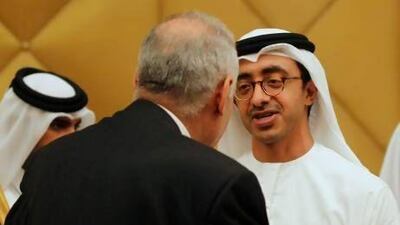ABU DHABI // The UAE's foreign policy is making an effective contribution to international peace and stability, reported the state news agency Wam yesterday.
Laid down by the country's founding President, the late Sheikh Zayed, the framework of the policy is characterised by prudence, tolerance and moderation.
One of the main focuses for the UAE is to find a lasting solution to the conflict in the Middle East, and engage in matters such as the fight against global terrorism, the war in Syria and developing global ties.
"The UAE's foreign policy is robust and is instrumental in bringing together various players on multiple issues," Dr Theodore Karasik, the director of research at the Institute of Near East and Gulf Military Analysis, said yesterday.
"The issues the UAE has been instrumental in globally include cyber warfare and anti-cyber crime, fighting Somali piracy and working with nations on countering violent extremism."
The UAE believes peace cannot be achieved while the Israeli occupation of the Palestinian and other Arab territories continues.
The Government "supports an end to Israeli occupation and the establishment of an independent Palestinian state with East Jerusalem as its capital, within the context of an agreement based on the Arab Peace Initiative", Wam reported.
The Minister of Foreign Affairs, Sheikh Abdullah bin Zayed, has spoken out against the inactivity of world nations on this issue.
"The problem is if the international community keeps considering the Palestinian issue as a secondary topic and does not take serious steps to stop such brutal attacks," he said last year.
"As Arabs, we have to sit together and come up with positive, mature thoughts that can deliver on the repeated promises that have been given to the Palestinians."
The UAE's goal in the region, Dr Karasik said, was to be a stabilising influence during a time of dramatic change.
This stable, diplomatic approach is reflected in its position on Iran.
Despite the long-running dispute over the three occupied UAE islands of Abu Musa and Greater and Lesser Tunbs, in addition to worries about Iran's nuclear programme, the UAE has kept all channels of constructive engagement open.
"While continuing to demand the restoration of the UAE's full sovereignty over the three islands, the UAE remains committed to its proposal that the issue should be settled either through direct, serious negotiations or by referral to the International Court of Justice," Wam said.
Another key area of UAE foreign policy has been its involvement in the global fight against terrorism.
While emphasising the need for a clear definition of terrorism, the UAE has insisted that state-sponsored terror should not be tolerated.
The country also opened, in December last year, the Hedayah (Guidance) Centre, also known as the International Centre for Excellence in Countering Violent Extremism. The centre in Abu Dhabi is supported by a number of friendly countries.
The report also branded the war in Syria "appalling and dangerous".
"The UAE supports the emergence of a nonsectarian government in the country, which will protect the rights of its various communities," Wam said.
"The UAE has provided substantial support for refugees in neighbouring countries while participating in the Friends of Syria group, supporting Arab and international initiatives to bring the bloodshed to an end, and in the work of the taskforce entrusted with future reconstruction of the Syrian economy."
The Minister of State for Foreign Affairs, Dr Anwar Gargash, said last year: "After the decades of suffering of the Syrian people, a new generation open to the world should be rehabilitated, to motivate the creativity and innovations seen among Syrians abroad."
Relations with Nato have also developed significantly since the UAE joined the Istanbul Cooperation Initiative in 2004.
The UAE sent a fleet of F16 jets to Libya in 2011 to fight alongside British Typhoons and French Rafales to help in Nato's Libya operations.
"The operational readiness they showed when they joined the Nato campaign in Libya was impressive," the Royal Air Force's air chief marshal, Sir Stephen Dalton, said.
"For a non-Nato partner, the UAE was quick to jump straight into the action. Their capabilities and readiness are comparable to the Swedish air force, which is clinical."
Beyond the region, the UAE is building relations with industrialised and developing countries while strengthening ties with its traditional allies in the West and those in South and East Asia, Wam added.

